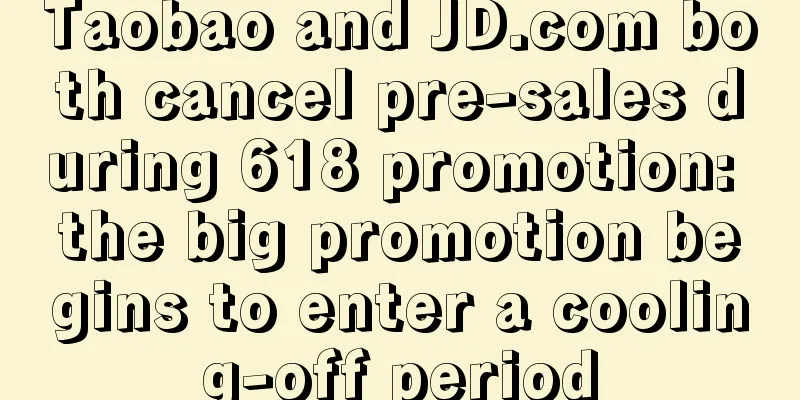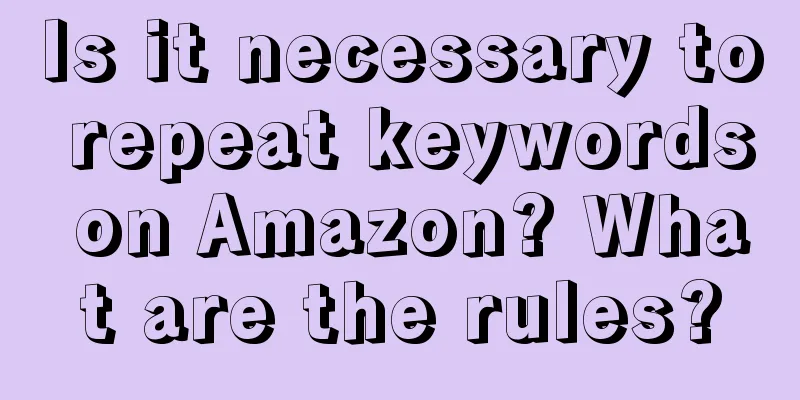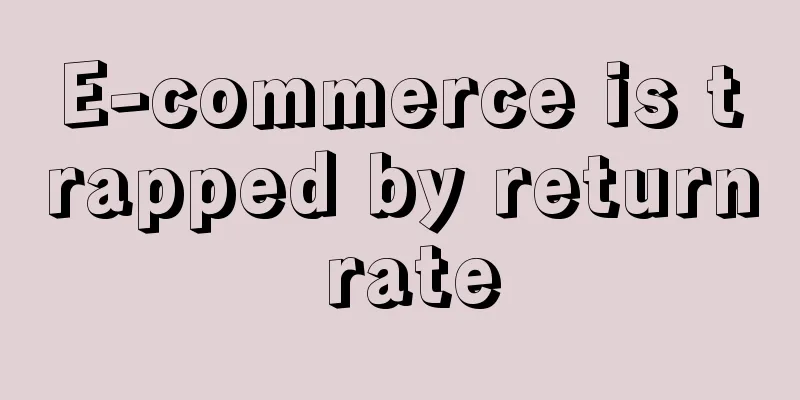Taobao and JD.com both cancel pre-sales during 618 promotion: the big promotion begins to enter a cooling-off period

The annual 618 promotion may appear in a straightforward way this year. JD.com and Taobao cancelled pre-sales for the first time and started selling directly at the end of May. JD.com will start the 618 promotion at 8 pm on May 31, with spot sales, followed by the special period, climax period and return period. According to public information, JD.com will still carry out promotion activities around its main low-price strategy this year. This year, Taobao and Tmall directly introduced a cross-store discount policy of 50 yuan off for purchases over 300 yuan. The pre-sale period and final payment period, which were the classic gameplay of Taobao's big promotions in the past, have been cancelled. This year, Taobao's promotional activities around 618 have become more intensive and the duration has been extended accordingly. The "10 billion flash sale festival" from April 23 to 28 is like a warm-up for the official 618 activities. The first wave of 618 activities is from May 21 to 28, and the second wave is from 8 pm on May 31 to June 20. In terms of consumers’ perception, the biggest change during 618 is that the cycle for consumers to complete their consumption has become shorter, and the math problem has become simpler. The previous 618 also started at the end of May. Taobao and JD’s approach was to start with a wave of deposit pre-sales, and then start paying the balance about a week later. A large number of consumer coupons were issued between these two activity periods to accumulate a wave of popularity. Taobao once made a lot of innovations in the pre-sale mechanism, from the initial final payment which could only be paid separately to the ability to combine orders to get a discount. Earlier, there were reports that pre-sale orders accounted for one-third of the total number of orders for the entire promotion. So, why did Taobao and JD.com suddenly cancel pre-sales this year? Let’s start with the pre-sale system itself. Retail e-commerce expert Zhuang Shuai analyzed to Zhiwei that as the scale of the promotion increases, the number of merchants and consumer groups participating in the pre-sale continues to expand, and problems have begun to emerge, “For example, pre-sale goods cannot be delivered on time, the price difference is increased, the after-sales service is inconsistent with ordinary goods, and even financial risks appear.” This series of problems will worsen consumers' consumption experience and increase consumption risks, and the platform's reputation and other merchants on the platform that normally sell goods will be affected. Therefore, JD.com and Taobao have both canceled the pre-sale system, which is actually solving a historical problem. During the 618 period in 2022, a consumer reported that he encountered a pre-sale price increase on JD.com. She said that before 618, she bought a product worth 3,599 yuan, thinking that she would place an order after 618. But after the store started the 618 pre-sale, she found that the price of this product had increased by 1,500 yuan. The consumer said that the same was true for another product in her shopping cart. The price of the product before and during the 618 pre-sale increased three times in three days. This is actually a problem caused by a bug in the promotion mechanism. When participating in big sales, merchants must follow the preferential policies given by the platform, offer direct discounts, or participate in full-reduction discounts, but they still have the right to set their own prices. On the one hand, they cannot miss the big sales, but on the other hand, it is difficult to offer direct discounts, so some merchants will come up with the bad idea of secretly raising prices. This kind of unseemly shady operation is naturally not the majority, but even if all merchants participate in the pre-sale of big promotions in compliance with regulations, the pre-sale system itself will extremely consume the consumer experience. Some consumers have previously pointed out that they could have placed orders and received goods quickly, especially when they needed something urgently, but once there was a big sale, they had to get into their rhythm, and it would take at least a week from paying the deposit to receiving the goods. E-commerce has developed to a stage where it is pursuing faster logistics and better consumer experience. However, this has become a paradox in the face of big sales. Moreover, the real money discounts that big sales can offer are getting fewer and fewer. Therefore, consumers’ experience deteriorates, and they are more likely to consider returning the product during the “consumer cooling-off period” from the deposit to the final payment, which directly increases the merchant’s return and refund ratio. Then there are the thorny issues of logistics pressure, after-sales disputes, and so on. Looking at the entire e-commerce environment, big sales have become more of a gimmick than a reality. Low prices are no longer achieved solely through big sales, not to mention that the attitude of e-commerce towards big sales has already changed dramatically. E-commerce may no longer need big promotions. The pre-sale system was originally a way for the platform to work with merchants to lock in consumer demand in advance before big sales by offering lower prices. According to the earliest pre-sale regulations, after consumers pay the deposit, they can only get a refund for the entire order after paying the balance. To a certain extent, deposit orders help sellers and platforms complete part of the sales tasks. In an era of crazy competition in GMV, live streaming and super low prices during big sales, the benefits of locking orders in advance through the pre-sale system can be directly reflected in the GMV report cards produced by each e-commerce company after the big sales are over. So, in a sense, this is serving the "battle report data" of each platform rather than consumers. In the past two years, e-commerce platforms are no longer obsessed with GMV, and have even stopped announcing GMV of big promotions. Sales scale has gradually become a thing of the past in the e-commerce field, and has been replaced by business quality and experience. Now, big sales are more low-key, with shorter cycles, and no longer require the same level of publicity as before. This indicates that big promotions will no longer bear the heavy responsibility, whether it is early stage warm-up, mid-term exposure or later sales results. "The emergence of live streaming and Pinduoduo's price-driven platform mechanism have allowed promotions to take place in a centralized manner every day. Most brands no longer need to rely too much on the platform's big promotions to sell their products," said Zhuang Shuai. What will the future promotions look like? JD.com and Taobao are taking different paths. Judging from JD.com’s actions this year, low prices are still the core, but the gameplay has been simplified. In addition to the platform traffic continuing to tilt towards low-priced goods, JD.com has also added a new gameplay of "lowest price in half a year" in this year's 618 promotion. If merchants successfully register for 618, and the price of the goods during 618 is lower than the price in the past 180 days, the merchants can automatically participate in this gameplay. To put it bluntly, JD.com's move is to directly ask merchants for the lowest price and return to the essence of big promotions. For JD.com, which has re-started the low-price war, fancy purchase combinations and pre-sales cannot directly achieve its low-price goal. The significance of the big promotion is to gain more actual discounts and pave the way for JD.com's subsequent price wars. On Taobao's side, the biggest change this year is that before the "May 1st Sale" and 618, it quietly tested a "10 billion flash sale festival" offering a direct 30% discount. Taobao's business model is very different from JD.com's. The large number of C stores and the lack of unified logistics support have made Taobao choose a different path, which is also the most comfortable path, which is to carry out promotional activities one after another and establish the impression of price power through intensive discount wars. Canceling pre-sales may just be the beginning. In the cooling-off period of the promotion, JD.com tends to start from merchants and platforms, take a practical route, and create an atmosphere of "I have the cheapest price here", while Taobao is better at creating festivals and taking a intensive route, which means "I always have discounts here". When big sales remove embellishments and abandon the atmosphere, the only essential problem left for the platform is how to come up with regular and real discounts. After all, no matter how it is packaged, the essence of e-commerce is still retail, and retail cannot circumvent price. |
<<: When You're Old: For those over 40 who are still looking for a job
Recommend
16 Restructurings of the AI Advertising Industry
The explosion of generative AI has brought new pos...
How does Shopee Malaysia set prices? Shopee pricing method
Friends who do cross-border e-commerce should all ...
What are the disadvantages of the Linio platform? What are its advantages?
There are still many cross-border e-commerce platf...
What problem should the brand solve?
Brand is not only a bridge between enterprises and...
What are the requirements for binding a credit card to Amazon? How to unbind a credit card?
We can buy some overseas products on the Amazon pl...
How long does it take to get the money from cross-border e-commerce? Super detailed money-making skills
Cross-border e-commerce is a global business model...
The economics behind Black Myth: Wukong
As a highly anticipated domestic 3A game, Black My...
Soft advertising volume and reporting anti-funnel are the A and B sides of Xiaohongshu's ecosystem
On Xiaohongshu, a diversified social platform, the...
Is new tea beverage a good business?
Compared with traditional tea drinks, new tea drin...
Which platform is better for cross-border independent stations? What platforms are there?
When it comes to cross-border e-commerce, I believ...
"Listen to the advice" of foreigners and dig into Xiaohongshu
Recently, many foreigners have flocked to Xiaohong...
Which holiday does Amazon offer the biggest discounts? How is the commission calculated for discounted products?
On the Amazon platform, as sellers, we can promote...
How can a WeChat public account have a chance to be recommended by the system?
This article will unveil the WeChat official accou...
What folk writings have you seen?
The copywriting comes from what we see and learn i...
Changes in Double Eleven: From traffic competition to reconstruction of high-quality supply
As Double Eleven enters its 16th year, the competi...









